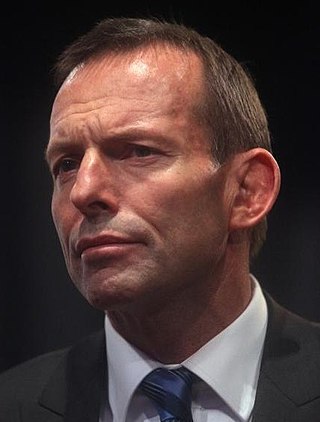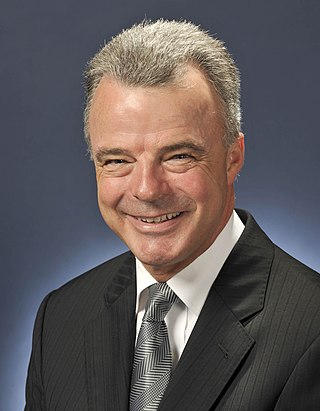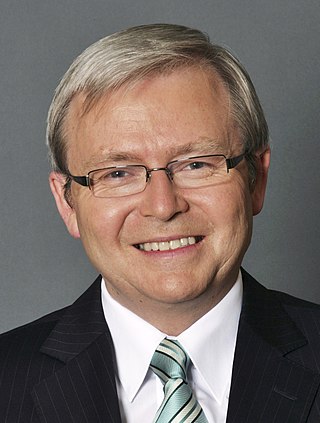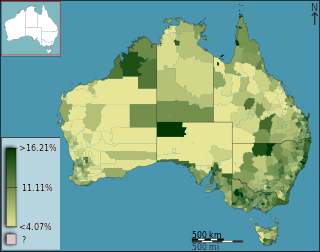
An alcopop is any of certain mixed alcoholic beverages with relatively low alcohol content, including:
- Malt beverages to which various fruit juices or other flavorings have been added
- Wine coolers: beverages containing wine to which ingredients such as fruit juice or other flavorings have been added
- Mixed drinks containing distilled alcohol and sweet liquids such as fruit juices or other flavourings

Kevin Michael Rudd is an Australian diplomat and former politician who served as the 26th prime minister of Australia from 2007 to 2010 and June 2013 to September 2013. He held office as the leader of the Australian Labor Party (ALP). Rudd has been the 23rd and current ambassador of Australia to the United States since 2023.

Anthony John Abbott is an Australian former politician who served as the 28th prime minister of Australia from 2013 to 2015. He held office as the leader of the Liberal Party of Australia.

Brendan John Nelson is an Australian business leader and former politician. He served as the federal Leader of the Opposition from 2007 to 2008, going on to serve as Australia's senior diplomat to the European Union and NATO. He now has a global leadership role with Boeing, an aerospace company.

The 2007 Australian federal election was held in Australia on 24 November 2007. All 150 seats in the House of Representatives and 40 of the seats in the 76-member Senate were up for election. The election featured a 39-day campaign, with 13.6 million Australians enrolled to vote.
Steven Fielding is a former Australian senator for the state of Victoria and the former federal parliamentary leader of the Family First Party. He was elected to the upper house at the 2004 federal election on two per cent of the first-preference votes. He failed to gain re-election at the 2010 federal election. His term ended on 30 June 2011.

Health care in Australia operates under a shared public-private model underpinned by the Medicare system, the national single-payer funding model. State and territory governments operate public health facilities where eligible patients receive care free of charge. Primary health services, such as GP clinics, are privately owned in most situations, but attract Medicare rebates. Australian citizens, permanent residents, and some visitors and visa holders are eligible for health services under the Medicare system. Individuals are encouraged through tax surcharges to purchase health insurance to cover services offered in the private sector, and further fund health care.

The 2009 Australian federal budget for the Australian financial year ended 30 June 2010 was presented on 12 May 2009 by the Treasurer of Australia, Wayne Swan, the second federal budget presented by Swan, and the second budget of the first Rudd government. Swan commented that the budget would be tougher than in previous years. "Projected government revenue has fallen by $200 billion since the last budget because of the global economic crisis."

The 2011 Australian federal budget for the Australian financial year ended 30 June 2012 was presented on 10 May 2011 by the Treasurer of Australia, Wayne Swan, the fourth federal budget presented by Swan, and the first budget of the Gillard government. The budget forecast a $22.6 billion deficit and delivered a $44.4 billion deficit.

The 2010 Australian federal budget for the Australian financial year ended 30 June 2011 was presented on 11 May 2010 by the Treasurer of Australia, Wayne Swan, the third federal budget presented by Swan, and the third budget of the first Rudd government.

The 2012 Australian federal budget for the Australian financial year ended 30 June 2013 was presented on 8 May 2012 by the Treasurer of Australia, Wayne Swan, the fifth federal budget presented by Swan, and the second budget of the Gillard government. The budget was described as a "battlers" budget with benefits geared towards families and low income earners. It forecast a surplus of $1.5 billion in the financial year ended 30 June 2013.

The 2013 Australian federal budget for the Australian financial year ended 30 June 2014 was presented on 14 May 2013 by the Treasurer of Australia, Wayne Swan, the sixth federal budget presented by Swan. The 2013 budget estimated total revenue of A$387.7 billion and spending of A$398.3 billion, a deficit of A$18 billion, with a return to surplus expected in the 2015 Australian federal budget. Some of the measures in the budget had been announced by various Ministers before the budget.

The Abbott government was the federal executive government of Australia led by the 28th Prime Minister Tony Abbott. The government was made up of members of the Liberal–National Coalition. The Leader of The Nationals, Warren Truss, served as Deputy Prime Minister. Following the 2013 Australian federal election held on 7 September, the Coalition defeated the second Rudd government, ending six years of Labor government. The Abbott government was sworn into office on 18 September 2013. Less than two years later on 14 September 2015, Malcolm Turnbull defeated Abbott in a leadership ballot, 54 votes to 44 and the Turnbull government became the executive government of Australia.

The 2014 Australian federal budget was the federal budget to fund government services and operations for the 2014/15 financial year. The 2014 budget was the first delivered by the Abbott government, since the Coalition's victory in the 2013 Australian federal election. Treasurer Joe Hockey presented the budget to the House of Representatives on 13 May 2014.

The 2015 Australian federal budget was the federal budget to fund government services and operations for the 2015/16 financial year. The 2015 budget was the second and last submitted by the Abbott government, since the Coalition's victory in the 2013 Australian federal election. Treasurer Joe Hockey presented the budget to the House of Representatives on 12 May 2015.

The Turnbull government was the federal executive government of Australia led by the 29th prime minister of Australia, Malcolm Turnbull, from 2015 to 2018. It succeeded the Abbott government, which brought the Coalition to power at the 2013 Australian federal election. The government consisted of members of Australia's Liberal-Nationals Coalition. Turnbull took office by challenging his leader, Tony Abbott, in an internal leadership ballot. Warren Truss, the leader of the Nationals, served as Deputy Prime Minister until he retired in 2016 and was replaced by Barnaby Joyce. Joyce resigned in February 2018 and the Nationals' new leader Michael McCormack became Deputy Prime Minister. The Turnbull government concluded with Turnbull's resignation ahead of internal leadership ballot which saw him succeeded as Prime Minister by Scott Morrison and the Morrison government.

The 2016 Australian federal budget was the federal budget to fund government services and operations for the 2016–17 financial year. It was presented to the House of Representatives by Treasurer Scott Morrison on 3 May 2016. It was the third budget to be handed down by the Liberal/National Coalition since their election to government at the 2013 federal election, and the first to be handed down by Morrison and the Turnbull government.

The 2018 Australian federal budget was the federal budget to fund government services and operations for the 2018–19 financial year. The budget was presented to the House of Representatives by Treasurer Scott Morrison on 8 May 2018. It was the fifth budget to be handed down by the Liberal/National Coalition since their election to government at the 2013 federal election, and the third and final budget to be handed down by Morrison and the Turnbull government.

The Morrison government was the federal executive government of Australia, led by Prime Minister Scott Morrison of the Liberal Party of Australia, between 2018 and 2022. The Morrison government commenced on 24 August 2018, when it was sworn in by the Governor-General of Australia. It was composed of members of the Liberal–National Coalition and succeeded the Abbott (2013–2015) and Turnbull (2015–2018) coalition governments in office, competing against the Australian Labor Party as the major Opposition party. Nationals Leader Michael McCormack was Deputy Prime Minister of Australia from the formation of the Morrison government until June 2021. He was replaced as Leader of the Nationals and Deputy Prime Minister by Barnaby Joyce.

The October 2022 Australian federal budget was the federal budget to fund government services and operations. The budget was presented to the House of Representatives by Treasurer Jim Chalmers on 25 October 2022. It was the first budget to be handed down by the Australian Labor Party since their election to government at the 2022 federal election. It was the second budget to be handed down in 2022, with the preceding budget being delivered in March by the prior government.











